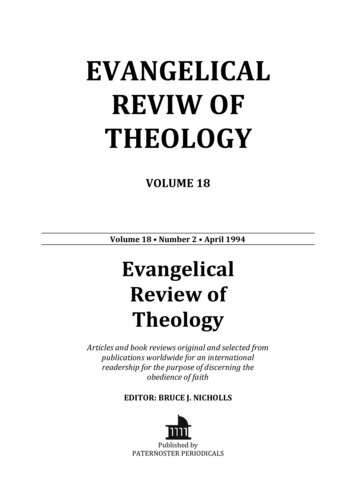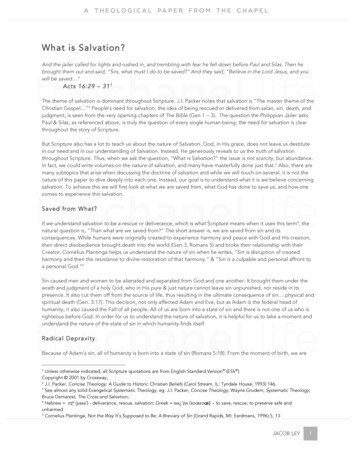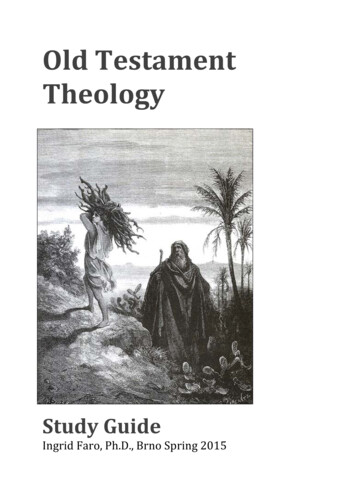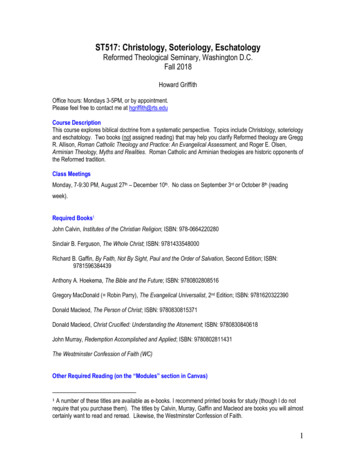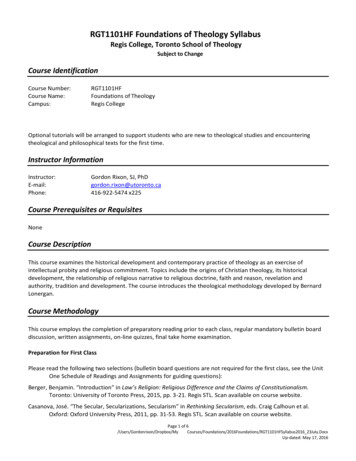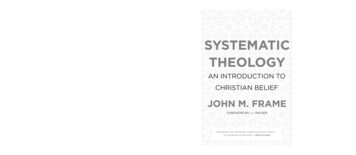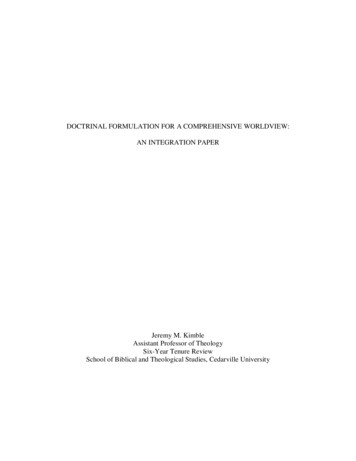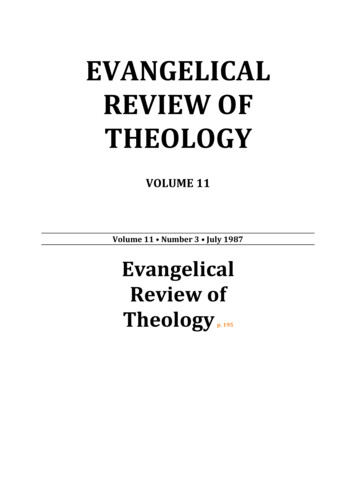
Transcription
EVANGELICALREVIEW OFTHEOLOGYVOLUME 11Volume 11 Number 3 July 1987EvangelicalReview ofTheologyp. 195
EditorialGod and Mammon?Ensuing from the theme of the last issue of ERT, viz. how to do theology in a given context,the theme of this issue concentrates—one way or the other—on the context of Mammon!All the seven articles and most of the book reviews demonstrate specific attempts to dotheology in the context of wealth.The three parts of the theme—Prosperity, Property and Poverty—are dealt with inseven articles, and every author/authoress writes out of an appropriate background:those who write on prosperity are from the prosperous countries, and vice versa. Sincethere are literally thousands of books on the theology of poverty, the emphasis in thisissue is rather on prosperity and property. Perhaps we are getting used to the sight ofmisery in our newspapers and on television?One way, prosperity and poverty are the opposites. One means super-abundance ofwealth while the other means the lack of it. Yet globally, with sociological, political andideological factors coming into play the opposition is not that simple. If the biblical camelthrough-needle-eye imagery seems to make the rich the cursed of the earth, Yonggi Cho’smessage, ‘I do not preach airied things like salvation but the Gospel of Success’ seems tobless them. In theologizing about wealth, it is revealing to note that each writer alsorelates his/her paper to one concrete area: D. T. Williams to Positive Thinking; Jon Bonkto Missions; Gilbreath to Capitalism; Barbara Gingerich to ecclesiology; Eisa Tamez to theKingdom of God, Chandrakant Shourie to Power, and Viv Grigg to Urban Poverty.Obviously the Christian conscience cannot tip the balance either in favour ofprosperity or poverty. For, Paul says ‘ I have learned to be content whatever thecircumstance is. I know what it is to be in need and I know what it is to have plenty. I havelearned the secret of being content in any and every situation, whether well fed or hungry,whether living in plenty or in want’ (Phil. 4:11–12). Apparently both the prosperity andpoverty advocates can find biblical support for their opinions, that prosperity is theevidence of God’s blessings or that poverty is due primarily to exploitation. Yet Paul’swords are nearer home: a disciple of Christ must be immune both to prosperity heightsand the poverty depths. The crucial question of course is not how much property I ownor lack, but rather my attitude to it. What role does Mammon play in my calculations, offamily life, business, ministry and even theology? Is not this the thrust of what Paul saidin I Timothy 6:10, that not money but the love of money breeds all kinds of evils?If it is true that in the next one generation the global Church will p. 196 primarily beoccupied with the question of poverty and prosperity, is it an exaggeration to say thatevangelical theology gains ground to the extent it develops a workable yet biblically soundattitude to Mammon in practical life situations?Editor p. 1972
Prosperity Teaching and PositiveThinkingD. T. WilliamsPrinted with permissionIf not a moral problem, Prosperity teaching is at least a theological problem. If theliberationists major on social salvation, prosperity teachers major on material salvation.The author convincingly traces the origin of prosperity teaching in Norman Vincent Peale’sPositive Thinking as well as a kind of Pentecostalism which has such a bent. Obviously, theprosperity syndrome need not be confined exclusively to the developed countries.EditorWhen the teaching on prosperity first appeared in Southern Africa, it was in groupsoutwardly very similar to Pentecostal and Charismatic churches, such that the particulardoctrinal emphasis on material prosperity could well be thought of as an extension oftheir characteristic teaching on the Holy Spirit. However, although it is true that many ofthese churches are now teaching an emphasis on prosperity, my contention is that thesource of the doctrine is not simply an extension of the classic Pentecostal doctrines, butis to be found in a combination of these with a group of ideas, known as ‘positive thinking’,imported from elsewhere, particularly the USA. The prosperity teachings are ‘ notablydifferent from the charismatic renewal of which they form a part, and from theirPentecostal and evangelical roots’ (Morran & Schlemmer 1984:11).1PROSPERITY TEACHINGIn order to demonstrate a source for these ideas it is necessary briefly to define what theseideas are.Material prosperity is the right of a Christian. There is a strong sense of the ability of Godand His relationship to the believer, such that if God p. 198 is in control of all, the believerhas access to it. He can and should live as a ‘King’s kid’ (Cho 1979:10). Hence it is believedthat a believer can, and should, be rich in a material sense.Positive confession. The main means of achieving prosperity is by ‘confession’ of theanswer to the need, not by referring to the need itself which is negative confession (Capps1982:255). Success is therefore claimed on the basis of texts such as Mark 11:24,Philippians 4:19 (Copeland 1974:29). If this is done, results are assured. However doubt,which is a negative form of confession, will prevent the desired results (Copeland1974:19, cf. James 1:7).Bible usage. The Bible is thus used in a fundamentalist way, in which texts are extractedfrom the context, both written and historical, and applied to the current situation.Pentecostalism cannot be seen as the only source of these ideas because of the definite differences invarious areas. For example, classic Pentecostalism tends to be spiritually rather than materially minded(Morran & Schlemmer 1984:31), it knows nothing of ‘positive confession’, and although it has a strongemphasis on tithing, the reason for this is not for personal gain but for Christian work.13
Although the whole Bible is referred to as inspired, it is noticeable that comparatively fewtexts are used.Faith. The key to receiving prosperity is the exercise of faith. However, faith is lookedupon not so much as trust but as a positive action (Hagin 1978:13). If something materialis claimed, then the person must act as if he has already received it, or his faith is not real,and consequently he will not receive (Copeland 1974:80, but cf. 1974:105). Faith cantherefore be viewed as an instrument to influence God, with the consequent loss of Divinesovereignty to the human will.Other techniques. In addition to positive confession, other ways of achieving prosperityare used. These are agreeing with another, on the basis of Matthew 18:19, where bothclaim together (Copeland 1974:96), and the ideas of ‘seed faith’. This latter, taken fromMark 10:30, and relating to the practice of tithing, teaches that God will repay any gift tohim at the rate of one hundred-fold, possibly over a period of time (Copeland 1974:66f).As in the case of positive confession, doubt as to the efficacy of the technique (takenhowever as mistrust of God) will stop the return.Underlying theology. Apart from the direct approach to Biblical texts, there is an impliedtheology which is used to support the claims made. This is rooted in a view of theatonement as a substitutionary sacrifice (Capps 1976:43, 153), although other views ofthe atonement, particularly the ‘Christus Victor’ of Aulen, could well be similarly used. Thesubstitutionary theory indicates that on the cross Jesus suffered for our sins, thussubstituting his life for our punishment. Prosperity p. 199 teaching extends this idea tothe material realm, arguing that if Jesus took on himself our sins, then he also took onhimself material needs as well (McCauley 1984:14). Then just as spiritual salvation isclaimed as a result of faith, so prosperity, or material salvation, may likewise be claimed(Copeland 1974:51).2Health. Although not directly a part of the complex of ideas, teaching on health is alwaysassociated with it. Health can therefore be claimed as a Christian right (Capps 1976:42),by a faith which will treat symptoms as spurious once healing has been claimed, or as adevice of the devil to cause doubt and non-receipt. The basis of the claim is again in thetheory of the atonement, with perhaps a bit more substance, in so far as Matthew 8:17applies Isaiah 53:4 to the healing miracles of Jesus.POSITIVE THINKINGIt was Norman Vincent Peale, more than any other, who popularized this technique, andit is on his writings that I wish to concentrate. Naturally he has also been influenced byearlier teachings.3 The ideas of Christian Science come immediately to mind here, butthere are significant differences. I mention just two. Firstly Peale, and prosperity teachingthereafter, can hardly be considered to treat matter as not really existent. Secondly, andthis is perhaps more significant, whereas Christian Science denies the reality of evil, Peale(1960:9) does not refuse to recognise the negative, but rather refuses to dwell upon it,and the prosperity teachers deny its existence only after the claim of health or prosperityhas been made. A more likely possibility is the influence of existentialist ideas on Schuller(Voskuil 1983:151), but he insists that any influence is indirect, more likely due to the2For a discussion of this aspect of the prosperity message, see Onken 1980.3Voskuil 1983:115f refers to his immediate predecessors.4
‘spirit of the age’. I am not holding Peale totally responsible for the excesses of the teachingtoday. There have, after all, been many similarities in the past. Verryn (1983:10) seessimilarities with the Sadducees.4 Swaggert (1980) also connects the prosperity teachingwith Gnosticism. Here Voskuil (1983:118) sees a similarity between Quimby (Christian P.200 Science) and neo-Platonism.5 With both the Sadducees and the Gnostics, however,there is no historical link with the prosperity teachers. Indeed Swaggert (1980:5) doubtswhether any of the present day prosperity teachers know anything about Gnosticism. Itwould seem rather that the very evident human desire for material success is bound tomanifest itself in various ways from time to time. Peale was no scholar (Timmerman1985), and neither are prosperity teachers. Perhaps the closest definite indication ofdependence is seen in that both Peale and the prosperity teachers have been successfullypropagating their doctrines in the same geographical area (the Western world, especiallythe USA) and therefore with respect to the same culture and problems. 6 Similar toSchuller, Carnegie (1955:42) sees self-esteem as one of the most powerful humanmotivations. More specifically, one link, probably not the only one, can be seen in the cleardependence Of Robert Schuller on Peale (Voskuil 1983:17), and then the influence bySchuller on Cho, seen in a foreword (Cho 1979), who openly propagates prosperityteaching. Such links are however tenuous. I want therefore to consider the aspects ofprosperity teaching in turn and note similarities in the writings of Peale.The Prosperity Teaching of Peale can be summarised as follows:Material success is a right. An important facet of Peale, taken from his liberal background,is the idea of the love of God, coupled with a belief that Christians are God’s sons. ThusPeale believes that he can affirm his health because ‘I am a child of God’ (1960:215). Ofcourse the entire thrust of his books concerns success and how to achieve it. Generallyhowever he sees this as a result of the positive atttitude to life which is his prime objective,rather than as an end in itself which is the stand of the prosperity teachers. However, inAmerican culture, p. 201 the two are really inseparable. Peale thus gives many examplesof how positive thinking has resulted in material success and goes so far as to sayexplicitly: ‘There was a time when I acquiesced in the silly idea that there is norelationship between faith and prosperity ’ (1953:229).Usually a disciple is more extreme than the person he follows, and this idea is moreexplicit in Schuller. His biographer refers to his system as ‘success through positivethinking’ (Voskuil 1983:3), and in his own writings he has no doubt that the acquisitionAn example is their literalistic interpretation of the Scripture. More importantly, Verryn notes that theydid not challenge the existing order of society, but worked with it for their own prosperity. Thus theyreflected the assumptions of the time. This is clearly true of Peale, and Voskuil (1983:156) says the same ofSchuller, Peale’s ‘disciple’.4The major point that Swaggert makes is the syncretism of Gnosticism, and it certainly seems evident thatthe prosperity teaching is an amalgam of Christianity with the prevalent Western materialism. He notes acouple of other points of similarity such as the raising of man to autonomy, near divinity, and the power ofthe ‘word’. One of his major points, however, of a supposed dualism in the prosperity teaching betweenbody and spirit, as occurs in Gnosticism, is, I believe, untenable, as one of the pillars of their theologicalposition is that spiritual change should have material results. Moreover prosperity teaching does not leadin itself to either asceticism or antinomanism as the Gnostic dualism did, although the emphasis onindividual revelation and authentication has led to the latter from time to time. Peale however tends to bedualistic (‘The body is but a temporary tool of the real person, who is spirit’ (1960:259)) as his spiritualistexperiences also show (Timmerman 1985).5 a self-help religious tradition has flourished in America [and] identified success as a product ofcharacter’ (Voskuil 1983:116).65
of wealth is correct and something to thank God for (Schuller 1982:116). In fact he evenclaims to have removed this question from being an issue for a Christian, which itadmittedly has been for centuries, seeing the solution in the idea that sacrifice isnecessary for success (1982:28). In this he is anticipating the ideas of ‘seed faith’.Positive confession. The basic standpoint of positive thinking is the affirmation andconcentration of the positive aspect of any situation and the rejection of any negativeaspects. Thus Peale says: ‘I discovered that if you expect the best you will get the best’(1953:112), or ‘big thoughts get big results’ (1960:36), and solves big problems bypraying big prayers (1953:7). His belief is that the power of the mind will act upon thesituation and itself be effective. Although he attributes the power of change to God, 7reference to mind conditioning is much more common although he quotes Romans 12:2as a justification for this (1960:32f). Thus he advises, ‘Repeat the affirmation daily’(1957:20), ‘Speak to your muscles every day and to your nerves’ (1953:102) (thespeaking should be aloud!). Schuller advises likewise (Voskuil 1983:85), as do otherprotagonists of the technique. Thus Hill & Stone (1961:200) report the effects of having agroup of salesmen chant in unison ‘I feel wealthy, I feel happy, I feel terrific’, and advise(1961:69) the writing down ‘with emotion’ [sic] twice daily a statement of desire formoney. Carnegie (1955:85) advises, ‘Act as if you were already happy, and that will tendto make you happy.’ Thus Peale refers to the ‘ amazing untapped power you have withinyou .’ (1957:27), and secular positive thinkers talk of the mystic powers of the mind (Hill& Stone 1961:67). It is a short step to clairvoyance and telepathy (cf. Hill & Stone 1967:78,Peale 1960:250f), and not surprisingly, Peale’s autobiography refers to spiritualism, andvisits from his dead parents (Timmerman 1985).Peale is equally sure that negative thoughts are counter productive. p. 202 He writes,‘Positive thinking will not work unless you believe it will work’ (1960:28), and, ‘Theywater it down with timid little doubts’ (1960:28). Likewise Schuller says a negativeemotion must never be verbalized (Voskuil 1983:80).In contrast to secular users of positive thought, and the prosperity teachers, Peale doesnot believe that anything can be achieved, irrespective of the will of God. He feels one onlyreceives what will be good. He writes, ‘ on a faith basis your desire will only be for thatwhich you can ask in God’s name’ (1957:4). In a similar way, Peale believes that guilt, dueto wrong action, will restrict the power of thought (1960:25). Of course the prosperityteachers are in harmony with this, but believe that prosperity is always the will of God(e.g. Capps 1976:33, 153).Bible usage. This is one of the biggest areas of difference from the prosperity teachers.Peale is not a fundamentalist, so does not regard Bible texts as effective in themselves, butas valuable for conditioning the mind. He can advise opening the Bible at random to read(1960:190). Thus Philippians 4:13, which is taken by prosperity teachers as a proof text,is used by Peale as an inspiring text, to be frequently repeated. Schuller (e.g. 1982:119)does the same. A similar treatment is given to Mark 11:24 (1960:155) which is one of thekey texts of Hagin (e.g. 1978:6) and other prosperity teachers. Even secular positivethinkers use the Bible (and other inspiring works) in the same way e.g. Hill & Stone(1961:20, 301).E.g. ‘Always act as if it were impossible to fail and God will see you through’ (1960:15, quoting anacquaintance with approval).76
A similar aspect is the fact that Peale and Schuller did not emphasize theirdenomination (cf. Voskuil 1983:15). Peale sees the value of any faith as inspirational, 8 andnotes the acclaim of positive thought by those of all religions, ‘Catholics, Protestants andJews’ (1960:6). It could well be argued, as in the case of Schuller also, that there is actuallylittle connection between their technique and Christianity (cf. 1953:160, 1957:7). It isworth noting here that most of the churches which propagate prosperity claim to be‘interdenominational’.Faith. The title of one of Kenneth Hagin’s booklets is ‘Have faith in faith’, which adequatelyreflects the attitude of the prosperity teachers, that results come as a result of faith. Thisis echoed by a similar statement of Peale, ‘Don’t be afraid to trust faith’ (1957:1). Of coursep. 203 both Peale and the prosperity teachers see the actual power as coming from God,although Peale often refers directly to the power of the mind (e.g. 1957:27), and this iseven more so in other advocates of positive thought who even make references to themind’s ‘mystic powers’ (e.g. Hill & Stone 1961:67). 9 Thus he frequently urges theimagining of the desired result, because this in itself is effective. 10Nevertheless Peale is generally seen as attributing the ultimate choice to God. 11 Thisis less extreme than the prosperity teachers, who rather, on the basis of texts such as Mark11:24 and Philippians 4:19 see any claim to riches as in God’s will (e.g. Cho 1980:30).However Peale thinks rather of influencing God to help. He speaks of an agreement withGod,12 a belief echoed in the prosperity teachers (e.g. Copeland 1974:38f). This howeveris not far removed from his usual statement of the power of the mind. God helps the powerof the mind,13 because a believer is a child of God with access to his power, and evenchanges the mind (Romans 12:2, Peale 1960:32f). Likewise the mind enables God to act, 14although one suspects that the belief in God expressed here is functioning as inspirationrather than using the power of God itself.Techniques. Clearly the main technique advocated by Peale is a form of mind conditioning,and this is naturally more clearly the case in secular advocates of positive thought. So Hill& Stone (1961:19) say that ‘PMA (Positive Mental Attitude)’ attracts wealth, success,happiness and health, whereas ‘NMA (Negative Mental Attitude)’ removes them. Themore characteristic techniques of the prosperity teachers are however not present. Thusthere is a suggestion of the agreement idea (1953:58, 1957:239), but more particularlythe ideas of ‘seed faith’, although not explicit, are certainly present in the form that it is p.8 E.g.‘ I have found that the sweetness of death is intensified in all men by a childlike faith in their religion what men cling to is the same throughout the world (1960:250).Peale also suggests this in places (e.g. 1960:244f). He writes, ‘Attitudes are more important than facts’(1953:14, quoting a ‘famous psychiatrist, Dr. Karl Menninger’), a statement with clear similarities to theposition of the prosperity teachers, and ‘your belief will help create the fact’ (1957:27, quoting WilliamJames).910E.g. ‘The minute you can see them in your mind, you already have them’ (1953:225).11E.g. ‘ hold a mental picture put the wish in God’s hands If it is His will He will grant it’ (1957:5).12E.g. ‘God and I struck up a partnership’ (1953:113, quoting a successful businessman).E.g. ‘Develop a tremendous faith in God and that will give you a humble yet soundly realistic faith inyourself’ (1953:7).1314E.g. ‘affirm “God is helping me’ ” (1953:15), ‘believe that you now receive power from him’ (1953:18).7
profitable to the giver to give.15 This of course is a standard secular technique, so DaleCarnegie (1955:41f) advocates boosting the other person’s self-esteem in order to gaincontracts from him.16 Nevertheless, Peale sees the benefits as coming from far more thanpsychology. He quotes Malachi 3:10 (1960:111), and speaks of the miraculous provisionof God (1960:115). Naturally however the full doctrines of tithing and particularly thehundred fold return (Mark 10:30) are not to be found as these are more distinctly biblical.204Underlying theology. There is no connection made with the atonement in any of thewritings of the positive thinkers. Peale bases his belief in success, where it is simply dueto the power of the mind, on the love of God.17 Further than this he does not go. Schullerhowever goes further and tries to systematize a theology. Like Peale he says that ‘God’splan calls for us to succeed’ (Schuller 1982:120). He attempts to build his theology on theconcept of self-esteem, and prosperity and success will enhance a person’s self-esteem.There are perhaps a few hints of doubt about this idea. He says that society as a whole willbenefit from an individual’s success (Schuller 1982:12), 18 and urges self-denial (1982:70)as only the self-esteemed can really give (1982:116).19 Perhaps most significantly,however, Schuller justified the building of the ostentatious ‘Crystal Cathedral’ rather thansupporting the poor, by the need to evangelized in a culturally relevant way, by a low costper kilogram, but especially by individual revelation (Voskuil 1983:32). It is this last pointwhich finds many echoes in the prosperity teachers who frequently claim such personalrevelation (e.g. Copeland 1974:72, Hagin 1978:19).Health. Unlike the followers of prosperity teaching who have often eschewed medicalattention, and suffered as a result, believing that a p. 205 claim of healing was effective (cf.Farah 1980:1f etc.), Peale advocates a combination of God and the doctor (1953:185, 206).There is no claiming, or laying on of hands (cf. 1953:199f), except in the application ofpositive thought to the illness. He thus advocates an attitude of ‘I am going to be bettertoday’ rather than ‘I am not going to be ill today’ which tends to be negative (1960:215).His belief is in the power of the mind over the body, so sees a cause of ill-health in ill will,or links disease with wrong doing (1957:243). Similarly he treats the mind in order totreat the body, seeing a spiritual factor as a large element even in organic disability(1960:211). He believes that the mind influences the glands of the body (1960:213), andsays that mental infection must be removed in order to have a healthy body (1960:206).However healing is not prominent in his writings. Positive thought is effective forpsychosomatic complaints and for headache (1960:27) but for other matters the doctor’sadvice is advocated.15 Thus‘sharing stimulates and maintains success’ (1960:45), ‘learn to give the payoff will be more thanworth it’ (1960:104).Cf. also Schuller’s basic approach to theology which is ‘self-esteem’ (Schuller 1982), and Hill & Stone(1961:152) argue ‘the more you give of that which is good and desirable, the more you will get’.1617 E.g. ‘I am the rich child of a loving Father, all the Father has is mine claim health and wealth’ (1960:117quoting principles given in a class for businessmen based on Charles Fillmore’s book ‘Prosperity’), ‘Vibrantlife is surely God’s intent’ (1957:vii). (Similarly Hill & Stone (1961:20) assert that it is never God’s will to bepoor.)18An echo of Adam Smith’s ‘invisible hand’?Similarly McCauley (1984:15), on the basis of 2 Corinthians 9:8, claims that God prospers his church(Rhema) so that it can be a blessing to others as well. Cf. also Copeland (1974:57).198
PENTECOSTALISM AND PROSPERITY TEACHINGIt can bee seen that a large number of aspects of the prosperity teaching are to be foundin Peale, but by no means all, and those which are there are often carried further by theprosperity teachers. It is necessary to seek a second root to combine with the ideas ofPeale in order to clarify the origins of the teaching.The Charismatic and Pentecostal churches fill the gaps in Peale almost exactly.20Notably, although Pentecostalism has formed new denominations, the Charismaticmovement is across denominations and the prosperity churches are‘interdenominational’.21Material success. Here the Charismatic emphasis was originally more other worldly in thatit saw the gifts of the Spirit as causing, and as a result of, a close relationship with God.Nevertheless those gifts find application in this world, particularly the gift of healing. It isprobable p. 206 that a large measure of the success seen in such churches is also due tothe fact that they fulfill many of the adherents’ personal needs, particularly on theemotional level. The move from this to material benefits is not great. 22Positive confession. This is absent from charismatic theology except in relation to theclaiming of Bible promises which is however a secondary feature to proper positiveconfession.Bible usage. This major gap in Peale is filled totally by the classic Pentecostal teaching, andto a large extent by the modern Charismatic movement. The difference in these is due tothe fact that classic Pentecostalism was almost totally fundamentalist (Hollenweger1972:29–1f, Bond 1974:15) whereas the Charismatic movement is not, although it findsmost fertile ground in churches and individuals which are Bible based in their theology. 23So although Peale treats Bible texts as merely inspiring, a fundamentalist takes them asan immediate promise of God to him; he treats texts such as Mark 11:24, John 15:7 andPhilippians 4:19 as immediately applicable to him, with all the authority of God behindthem, such that they are promises to be claimed.Faith. The fundamentalist is easily driven to the position of the prosperity teachers onfaith. Treating the Bible as totally inspired by God, he is urged to trust any particular verseas the direct word of God to him. This is not, however, a distinctive of the Pentecostal20 Thisis not just a link with evangelical Christianity as in Schuller (Voskuil 1983:128), but specifically withthe emphasis of the Pentecostals on emotional worship and the work of the Spirit. Fundamentalism, in itself,is not so centered upon miracles.The obvious difference between Peale’s services and those of the Pentecostals is that whereas the latterhave exuberance in worship, Peale believed in quietness (1957:165, 225); for him the church building isfilled with mysterious powers (1957:206), which can be attuned to. However, it is arguable that bothCharismatic worship or quiet contemplation can have the same aim of putting the mind into the correctmode to exert power.21It is then noticeable that although the Pentecostal churches achieved great success, at least numerically,compared to traditional churches, the churches preaching prosperity experienced phenomenal growth. Forexample the Rhema Church in the Johannesburg area grew from about 15 at its establishment in 1979 toover 4000 by 1983 (cf. also Farah 1980:115, Cho 1983:33). There are however signs that a decline may haveset in.2223 Bond(1974:17) notes the doctrinal laxity of the neo-Pentecostals, who emphasize experience rather thandoctrine. This of course renders them susceptible to extra ideas such as that of prosperity.9
movement as such, although being Arminian in theology, they do tend to emphasize theneed of a response of faith (Bloch-Hoell 1964:124).Techniques. Here again the gap in Peale is adequately filled due to the fundamentalistemphasis. Obviously the texts referring to agreeing in prayer (e.g. Matthew 18:19) aretaken as literally applicable, but also the advice on giving which in Peale is not veryspecific is greatly enhanced. Here the teaching on tithing which is a feature of the p. 207Pentecostal churches (Bloch-Hoell 1964:152), but in their case for the support of thechurch, is linked with Peale’s ‘giving to get’ resulting in the prosperity approach.24 Therelevance of the Pentecostals to this is that such folk do have a background of tithing, someof which does go to other Christians, and would then be interpreted as part of the return.Moreover, they are accustomed to ‘direct revelation, and so are likely to believe that Godspecifically tells to give a gift, sometimes very generous, to another. These factors, withoutany necessary supernatural intervention, would alone lead to a form of vindication of thedoctrine.Underlying theology. Here also the Pentecostal and Charismatic movements fill a gap inPeale. Their doctrine of the atonement has been that of a substitutionary sacrifice (BlochHoell 1964:149), although I suspect that in recent years the ideas of victory appropriatedin the cross and resurrection has been more to the fore. In addit
theology in the context of wealth. The three parts of the theme—Prosperity, Property and Poverty—are dealt with in seven articles, and every author/authoress writes out of an appropriate
